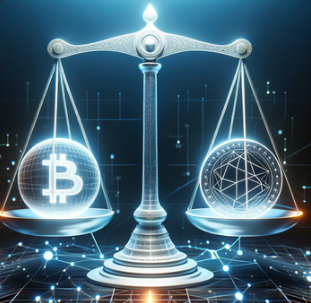The Rise of Crypto Communities and Decentralized Social Networks: A New Era of Online Communication
godidgo.com
12/3/20244 min read


Understanding Crypto Communities
Crypto communities have emerged as a significant component of the broader cryptocurrency and blockchain landscape. These communities consist of individuals who share common interests and passions, primarily revolving around the concepts of decentralized finance, cryptocurrencies, and blockchain technology. The formation of such communities is primarily driven by the desire to engage in knowledge exchange, promote collaborative innovation, and foster a sense of belonging among their members.
One of the fundamental aspects that contribute to the growth of crypto communities is the thirst for information and understanding of complex technologies. As cryptocurrencies gain popularity, individuals often seek platforms where they can discuss ideas, share experiences, and learn from each other. Social media platforms, discussion forums, and dedicated chat groups have all played crucial roles in facilitating these interactions. For instance, Reddit has numerous subreddits, such as r/CryptoCurrency, that cater to a variety of interests related to cryptocurrencies, from market trends to specific projects. Similarly, Telegram and Discord have popular channels and servers where members can discuss real-time updates and insights about cryptocurrencies.
The sense of community within these networks often nurtures innovation. Members collaborate on projects, share technical knowledge, and provide feedback on various cryptocurrency ventures. Additionally, these communities serve as support systems, allowing individuals to seek advice or help from experienced members during their cryptocurrency journeys. This collaboration is essential for fostering a vibrant ecosystem that encourages the development of new ideas and applications in the blockchain space.
Furthermore, many crypto communities emphasize inclusivity and accessibility, welcoming individuals from diverse backgrounds who share a common goal of exploring digital currencies and decentralized technology. Some notable examples include the Bitcoin and Ethereum communities, both of which have extensive networks across multiple platforms, helping to shape the future of this digital frontier.
The Emergence of Decentralized Social Networks
Decentralized social networks represent a significant shift in the paradigm of online communication, diverging from the models established by traditional social media platforms. Unlike conventional networks that operate on centralized servers, decentralized social networks utilize distributed architecture, enabling users to interact without relying on a single authority. This fundamental difference offers several advantages, chief among them being enhanced privacy, greater user control, and heightened resistance to censorship. In a decentralized environment, users maintain ownership of their data, allowing them to share and communicate freely without the interference of corporate entities.
The technological foundations of decentralized social networks are largely rooted in blockchain technology and peer-to-peer protocols. Blockchain serves as a transparent and secure method for recording transactions, ensuring that users can trust the integrity of the information exchanged. Peer-to-peer protocols facilitate direct connections between users, which not only improves the speed of communication but also enhances the overall reliability of the network. These technologies work in tandem to create a robust ecosystem where every participant has equal footing, further diminishing the control exerted by any single organization.
Several prominent examples of decentralized social networks are currently in use, illustrating the potential of this emerging approach to online interaction. Platforms such as Mastodon and Diaspora employ decentralized architectures, allowing users to create their own servers while still connecting with others across the network. These platforms exemplify the community-driven nature of decentralized social networks, empowering users to shape their online experiences without compromising on privacy or freedom of expression. As more individuals and groups recognize the benefits of decentralization, it is poised to play an increasingly vital role in redefining how we engage with social media.
The Intersection of Crypto and Communication
As digital transformation continues to evolve, the intersection of crypto and communication has become a vital aspect of how individuals and groups connect online. Crypto communities, characterized by their shared interests in decentralized technologies and blockchain, are reshaping traditional methods of communication. These communities leverage decentralized social networks, which provide a platform that prioritizes user privacy, autonomy, and democratic participation. The unique nature of these platforms enables users to engage with one another in ways that challenge conventional social media paradigms.
Within crypto communities, communication styles differ from mainstream platforms. Members often utilize specific language, jargon, and cultural references that resonate deeply with the ethos of decentralization and financial sovereignty. Forums, chat rooms, and group chats serve as essential venues for exchanging ideas, supporting projects, and mobilizing resources for various initiatives. This environment encourages members to express their thoughts freely, fostering an atmosphere of collaboration and shared knowledge.
Token economies within these communities further enhance communication dynamics by introducing tangible incentives for engagement. By participating in discussions, sharing content, and contributing to projects, members can earn tokens or rewards specific to their community’s ecosystem. These incentives not only drive participation but also ensure high-quality content creation, as members strive to enhance their contributions to earn rewards. The incorporation of tokenized incentives allows for a more diverse and dynamic dialogue among community members.
Ultimately, the fusion of crypto and communication is creating new avenues for expressing ideas and fostering engagement. As individuals increasingly seek out alternative methods of interaction, decentralized social networks stand as promising alternatives to traditional social media platforms. Through the combined power of crypto communities and these innovative networks, a more equitable and participatory paradigm of online communication is emerging.
The Future of Online Communication in the Crypto Space
The rise of crypto communities and decentralized social networks is set to transform the future of online communication significantly. As these platforms gain traction, they promise a fundamental shift in how individuals interact, exchange information, and govern their digital identities. Central to this future is the idea of user empowerment, where individuals are given greater control over their data and interactions, contrasting sharply with traditional centralized networks.
However, several challenges will likely arise as these decentralized ecosystems grow. Scalability remains a primary concern; many blockchain protocols face difficulties in handling large volumes of transactions quickly and efficiently. As user adoption increases, ensuring that these networks can support millions of users without compromising efficiency will be crucial. Additionally, improving user experience will be essential in attracting a broader audience who may still be unfamiliar with blockchain technology and its implications for communication.
Regulatory considerations represent another area of complexity. Governments around the world are grappling with how to approach cryptocurrencies and decentralized networks. The impact of regulation could either support the growth of these platforms by providing clear guidelines or hinder their adoption by imposing restrictive measures. Balancing innovation with regulation will be vital in shaping a conducive environment for decentralized communication. The community-oriented nature of these platforms offers unique opportunities for emerging forms of governance, potentially leading to more democratic and participatory models.
Overall, the implications of these advances extend beyond just social networking; they may redefine privacy, autonomy, and trust in the digital realm. As individuals increasingly seek control over their online interactions, the innovations within the crypto space could influence broader communication trends. This could usher in an era where decentralized solutions provide a sustainable alternative to the existing systems, fostering greater engagement and collaboration among users.

Get in touch
Feel free to contact us to inquire about any of the Web2/DNS and Web3/Onchain domains showcased on our platform. We are open to receiving proposals and evaluating direct purchase offers for all the digital assets featured.
Our team is also available to explore tailored agreements and negotiated sales, ensuring a smooth and efficient acquisition process that aligns with your specific needs.
Connect with us to amplify your identity across both the Web2/DNS & Web3/Onchain landscape. Together, let's redefine the future of digital identities and brands.
Contact us now to elevate your DIDs & Brands to new heights, because in the world of Go DID Go! your Digital Identity is not just owned; it's celebrated!
Contact Us
info@godidgo.com




